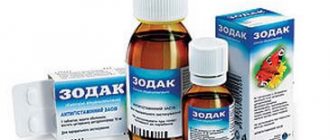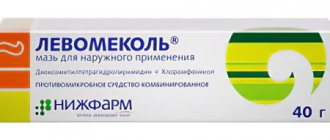The drug Captopril is one of the most commonly prescribed drugs to lower blood pressure.
The hypotensive effect of the tablets begins within 20-40 minutes after ingestion and lasts up to 6-12 hours.
Despite the fact that this drug is a real salvation for hypertensive patients, it, like most medications, can cause various negative reactions in the body.
Before starting to take this medicine, the patient needs to make sure that there are no contraindications, and also find out all about the side effects of Captopril.
What is Captopril FPO for?
Angiotensin-II is a hormone that constricts blood vessels and retains sodium in the body. Its conversion from angiotensin-I occurs with the participation of angiotensin-converting enzyme (ACE). Captopril is part of medications belonging to the group of ACE inhibitors. This means that it has an inhibitory effect on ACE activity, which lowers the blood concentration of angiotensin-II.
As a result, peripheral vascular resistance decreases, cardiac output increases and the ability to tolerate loads increases. Taking Captopril increases vascular blood flow, which nourishes the kidneys and heart. Long-term use reduces hypertrophy of the vascular walls and myocardium.
According to the instructions for use, Captopril FPO for high blood pressure is advisable to take in the following cases:
- hypertonic disease;
- myocardial infarction with impaired functioning of the left ventricle;
- providing assistance in case of hypertensive crisis;
- renovascular hypertension;
- parenchymal hypertension with rapid progression of glomerulonephritis;
- high blood pressure with bronchial asthma;
- nephropathy in diabetes mellitus;
- congestive heart failure, especially if the use of diuretics with cardiac glycosides is ineffective;
- primary hyperaldosteronism (Conn's syndrome).
Indications for use
This drug is prescribed for use in the following diseases:
- arterial hypertension;
- type 1 diabetes mellitus, nephropathy;
- heart failure;
- rehabilitation for heart attack patients;
- systemic lupus erythematosus.
Regardless of the disease, first of all, you should consult a doctor, who will also determine the dosage and duration of use.
At what pressure should I take it?
Captopril is one of the most popular medications used for high blood pressure. Many users would like to know about the features of taking this drug. At what pressure should Captopril FPO be taken, what does the instructions for use say? Captopril can be used for arterial hypertension, that is, when the pressure exceeds normal limits. It is important to limit your intake of sodium salts.
The instructions for use say that if Captopril-FPO is used at higher blood pressure levels (from 180/110 mm Hg), it must be combined with diuretics.
The dose of the drug is gradually increased to the maximum allowable amount - 150 mg / day. That is, the instructions for use say that the product is effective for any level of high blood pressure, it’s just that the doses are different under different circumstances and pathologies. Efficiency increases when combined with auxiliary therapy.
Stages of hypertension
Advantages of the drug
Captopril is a fairly effective drug used for heart failure and hypertension.
The drug has the following advantages:
- decrease in pressure indicators;
- lack of influence on potency in men;
- the possibility of using the medicine for elderly patients;
- the development of nephropathy is suppressed;
- the development of cancer is minimal;
- antioxidant effect;
- Death from heart failure when using the drug is extremely rare.
In addition, it is worth noting that Captopril has a fairly low price, and you can find it in any pharmacy.
Instructions for use of Captopril FPO
Captopril FPO is produced in the form of tablets of 25 and 50 milligrams. They are packaged in special cells of ten pieces. One box can contain from ten to one hundred tablets of the drug.
The instructions for use of Captopril FPO say that it is prescribed with 6.25 milligrams two or three times a day. Every two weeks the dose can be gradually increased. It is recommended to take the product one hour before meals.
For the use of the drug Captopril FPO, which lowers blood pressure, the following doses are recommended for various categories of patients:
- mild arterial hypertension - 25 mg twice;
- severe form of hypertension - no more than 150 mg (three times);
- chronic heart failure - 6.25–12.5 mg three times;
- elderly people - 6.2 mg twice a day;
- patients with diabetic nephropathy from 75 to 100 mg/day. ;
- moderate kidney dysfunction - from 75 to 100 milligrams per day;
- serious kidney disorders - with a dose not exceeding 12.5 mg per day.
The instructions for use of Captopril FPO say that after the first dose of the drug you need to monitor your blood pressure every half hour. This is necessary to understand how the drug acts on the body: when it begins to decrease, when it reaches its peak, when it begins to increase.
The maximum permissible dose of the drug is 150 mg per day. If you take a larger amount of the drug, the effect will not increase, but the risk of side effects will increase. Patients with renal failure are prescribed no more than one hundred milligrams per day. For elderly people, the dose of Captopril should not be raised above 6.25 mg, taken twice a day.
Release form and purpose
Captopril is the true name of the drug. There is a branded version of Captopril that you may be familiar with, called Capoten. Both medicines contain the same medicinal substance, with the same type of effect. But they are called differently because they are produced by different companies. Three doses are available in tablet form: 12.5 mg, 25 mg and 50 mg. In addition, Capoten is available in the form of a solution at a dose of 5 mg/ml, which is very useful if a person is unable to swallow a tablet.
If you are taking Captopril for the first time, you should follow your doctor's recommendations and start with a low dose. For example, you can start with a dose of 12.5 mg and gradually increase it over several weeks or months until you reach optimal blood pressure levels. This will reduce the risk of side effects that occur when you become addicted to the medicine.
Contraindications and side effects
Any remedy has contraindications and side effects. Captopril should not be used:
- during pregnancy and breastfeeding;
- bilateral stenosis of the arteries of the kidneys (or the only kidney);
- increased residual blood nitrogen;
- serious liver pathologies;
- hypotension;
- hypersensitivity to ACE inhibitors.
The instructions for use indicate that patients taking Captopril FPO for high blood pressure who suffer from autoimmune diseases should be examined every fourteen days for the number of leukocytes in a clinical blood test. If they are reduced by half, it is recommended to discontinue the drug.
A person taking this medicinal substance should seek advice from their GP at the first sign of any infection. The instructions for use of Captopril FPO say that it is not recommended to refuse to take the drug or change the dosage at your own discretion. Seek immediate medical attention if a patient taking this medicine experiences diarrhea, vomiting, or excessive sweating. According to the instructions for use of Captopril FPO, these symptoms dehydrate the body and lead to a decrease in blood pressure. In this case, taking the drug in the same dosage is dangerous.
Side effects may occur when taking the drug. Here are the main ones:
- hypotension, tachycardia, swelling in the legs;
- a sharp drop in blood pressure, fainting, dizziness, loss of consciousness;
- protein in urine;
- increased creatinine and urea;
- anemia, thrombocytopenia, neuropenia;
- headache, dizziness, loss of coordination of movements;
- constant fatigue;
- decreased sensitivity of the limbs;
- decreased visual acuity;
- bronchospasm, dry cough, pulmonary edema;
- dermatitis, various rashes, itchy skin;
- decreased appetite, taste sensations;
- diarrhea, abdominal pain, nausea, vomiting, hyperbilirubinemia;
- increased potassium and decreased sodium in the blood, disruption of the acid-base balance.
How does the drug behave in combination with other drugs?
It is important to remember that ACE inhibitors are not combined with all drugs. Therefore, if the patient is taking any other medications, you need to warn the doctor about this.
Combination of Captopril FPO:
- With immunosuppressants and cytostatics, the risk of developing leukopenia increases.
- With diuretics, drugs containing potassium, salt substitutes, trimethoprim - the development of hyperkalemia. This is due to the fact that ACE inhibitors retain potassium in the body, and it gradually begins to accumulate.
- With nonsteroidal anti-inflammatory drugs, kidney function may be impaired.
- With thiazide diuretics - a strong decrease in blood pressure, the development of hypokalemia.
- With drugs for anesthesia - the occurrence of severe arterial hypotension.
- With azathioprine there is a risk of anemia and leukopenia.
- With allopurinol – development of hematological disorders, severe hypersensitivity reactions.
- With aluminum hydroxide, magnesium hydroxide, magnesium carbonate, captopril is poorly absorbed.
- With acetylsalicylic acid - the effect of the main substance is reduced, the risk of decreased cardiac output in patients suffering from heart failure.
- With indomethacin, ibuprofen, captopril has a weaker effect.
- With insulin – development of hypoglycemia.
- With types of interferon, there is a risk of severe granulocytopenia - a decrease in granulocytes in the blood.
- With lithium carbonate – the concentration of lithium increases, with intoxication.
- With minoxidil, sodium nitroprusside - the effect of captopril increases.
- With orlistat, the main substance has a weaker effect, which can lead to a hypertensive crisis.
- With pergolide, the antihypertensive effect increases.
- With probenecid, the renal clearance of captopril is reduced.
- With procainamide there is a risk of developing leukopenia.
- With chlorpromazine, blood pressure drops significantly.
- With cyclosporine there is a risk of acute renal failure.
- With erythropoietins, captopril has a weaker effect.
- With digoxin, a strong concentration of this drug appears. This is typical for patients who have problems with kidney function.
When switching from clonidine to captopril, the drug has a weaker effect at first.
Patient reviews
Captopril is one of the most popular treatments for hypertension. It helps to lower blood pressure to normal levels in a short time.
Captopril FPO, reviews of which are varied, has been and remains a fairly popular drug for normalizing blood pressure. But it is important to remember that if a person has high blood pressure, they need to undergo a full examination to determine the cause of hypertension.
Reviews from patients showed that the greatest number of side effects were observed in patients over seventy years of age. The likelihood of side effects and complications increases in patients with a long history of arterial hypertension.
One patient, suffering from high blood pressure (up to 190 mm Hg) for five years, complained that Captopril did not help him at all and that he would like to try another drug. At the same time, not a word was said about who prescribed this drug to him and with whom he was going to consult in the future. To which he can answer that with this approach, nothing good awaits him, because all medications must be prescribed by a doctor.
User Milena felt ill at work: she had a severe headache. After finishing her work day, she went to see her friend, a pharmacist. She measured her blood pressure, which turned out to be 195/117, and gave her ¼ Captopril tablet under her tongue. After which the condition improved. This indicates the high effectiveness of the product. But the woman is still recommended to go to a medical institution and get tested. Her blood pressure is very high, and at this level there is a high risk of myocardial infarction and stroke.
Price and analogues
Captopril FPO is inexpensive - about 10 rubles, but there are a number of varieties that replace it, as well as each other. The difference between them is only in the names, the composition and effect are the same.
Recommended list:
- Captopril.
- Captopril-Vero.
- Captopril Hexal.
- Captopril Sandoz.
- Captopril-AKOS.
- Captopril-Acree.
- Captopril-Ros.
- Captopril-Sar.
- Captopril-STI.
- Captopril-UBF.
- Captopril-Ferein.
- Captopril-FPO.
- Captopril Stada.
- Captopril-Egis.
Identical drugs in structure:
- Kapoten. From a series of ACE inhibitors. One tablet contains 25 mg of captopril, excipients: cellulose, starch, lactose, stearic acid. Helps with arterial hypertension, chronic heart failure, dysfunction of the left ventricle after myocardial infarction. Service life - 5 years, should be stored at a temperature not exceeding 25 degrees. Read more about how to take Capoten for hypertension here.
- Arkadil. From the same series of inhibitors. The main substance is captopril, 25 g per tablet. Prescribed for arterial hypertension and heart failure. Shelf life - 5 years, at temperatures from 10 to 25 degrees.
- Blockordil. ACE inhibitor. Base – captopril, 25 mg, excipients – cellulose, lactose, starch, stearic acid. Helps cope with arterial hypertension and chronic heart failure. Shelf life - 3 years, temperature should not exceed 25 degrees.
Overdose
The effect of the drug is quite strong, so it is necessary to constantly monitor the amount of the drug taken and monitor the state of your health.
"Captopril" has characteristic signs of overdose:
- low blood pressure;
- pathological change or temporary disorder of cerebral vessels that participate in blood circulation;
- coronary heart disease, heart attack;
- thromboembolism or blockage of the pulmonary artery.
To reduce the symptoms of overdose, you need to stop taking the drug, lie on your back and fix your legs so that it is higher than the level of your head.
If the condition does not stabilize, rinse the stomach and seek medical help from specialists.
Pharmacological properties
Pharmacodynamics
Captopril is an angiotensin-converting enzyme (ACE) inhibitor that inhibits the conversion of angiotensin I to angiotensin II, thereby reducing the release of aldosterone. This effect leads to a decrease in total peripheral vascular resistance, blood pressure (BP), post- and preload on the heart.
Plasma renin activity does not affect the hypotensive effect. A decrease in blood pressure occurs both with normal and decreased levels of the hormone, which is explained by the effect on the tissue renin-angiotensin system.
Long-term use of captopril leads to a decrease in the severity of myocardial hypertrophy, as well as the walls of resistive arteries.
The drug also has the following effects on the body:
- increases renal and coronary blood flow;
- reduces platelet aggregation;
- increases blood supply to ischemic myocardium;
- helps reduce the concentration of sodium ions in patients with heart failure;
- reduces the degradation of bradykinin and increases the synthesis of prostaglandin.
Captopril dilates arteries more than veins.
Unlike the use of direct vasodilators (minoxidil, hydrazine, etc.), a decrease in blood pressure after taking captopril does not cause manifestations of reflex tachycardia and leads to a decrease in the myocardial need for oxygen. In heart failure, an adequate dose of the drug does not affect blood pressure.
After oral administration, the maximum decrease in blood pressure is observed after 1–1.5 hours. The duration of the hypotensive effect is dose-dependent and reaches its optimal value over several weeks.
Pharmacokinetics
Absorption of the drug is rapid and amounts to 75% (in the case of food intake, this figure decreases to 35–45%), bioavailability is 35–40% (as a result of the first pass effect through the liver). The drug penetrates poorly through the placental and blood-brain barriers (up to 1%). Approximately 25–30% of the administered dose is bound to plasma proteins (mostly albumin). When taken orally, the maximum plasma level is 114 ng/ml and is achieved after 0.5–1.5 hours.
Metabolized in the liver, resulting in the formation of captopril disulfide dimer and captopril-cysteine disulfide. Metabolites are pharmacologically inactive.
About 95% of the dose is excreted by the kidneys (40–50% unchanged), the rest in the form of metabolites. The half-life is 3 hours. Secreted into breast milk. 4 hours after a single oral dose, 38% of unchanged captopril remains in the urine, 28% of its metabolites. After 6 hours, only metabolites remain in the urine. Unchanged captopril (38%) and its metabolites (62%) were detected in 24-hour urine.
In chronic renal failure, Captopril accumulates. In patients with impaired renal function, the half-life is 3.5–32 hours.











